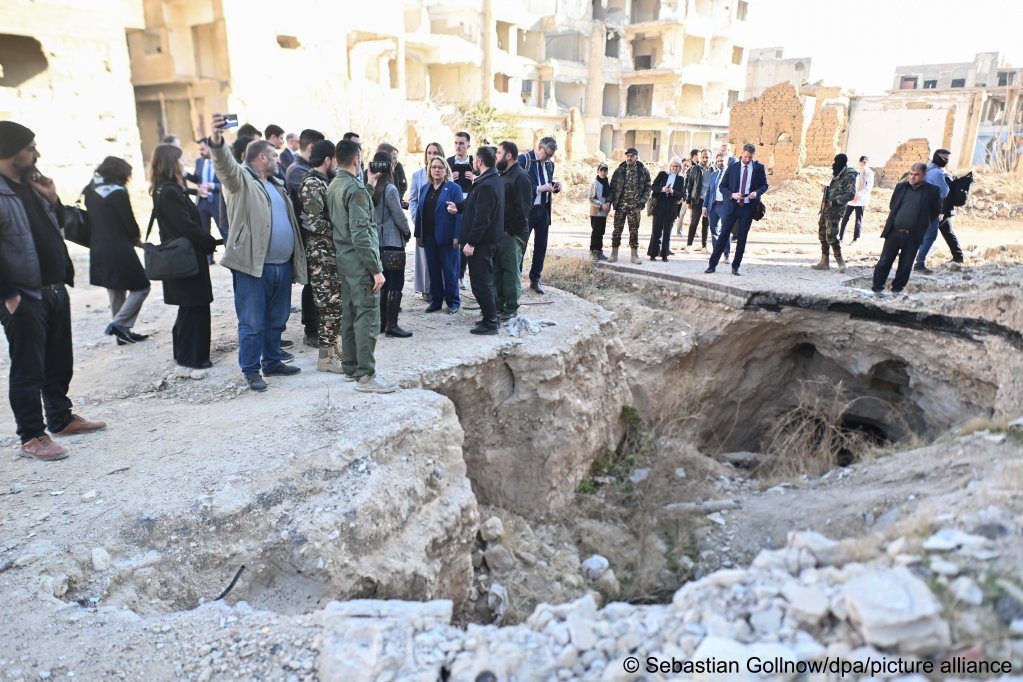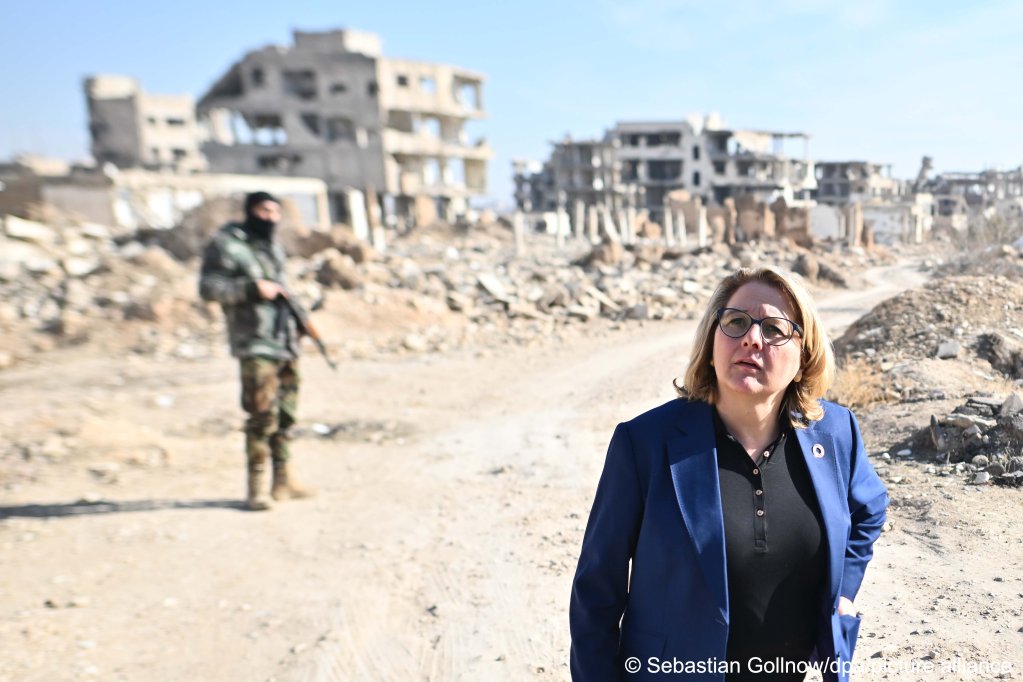Germany has one of the largest Syrian migrant communities in Europe. Now, the Federal Office for Migration and Refugees is offering financial incentives and support to Syrians who wish to return to Syria.
The current German government has barely a month left in its current term before the elections on February 23 this year. Now the German Federal Office for Migration and Refugees (BAMF) confirmed it would be offering financial incentives to Syrians returning home.
The returns scheme, entitled REAG/GARP, to which Syria was added on January 13, is designed to support migrants planning voluntary returns to their home country. The German government offers to cover travel expenses and a one-time support payment of 1,700 euros per person.

The German Catholic news agency KNA reported that the return program has a cap of 4,000 euros for each family group. Families may also be eligible for medical support in Syria, with up to 2,000 euros per person in the first three months after returning.
Read AlsoGermany's migrants 'deserve more respect' says German minister
Syrians in Germany
According to the German Interior Ministry, there are around 975,000 Syrians registered in Germany, with most holding refugee or other protected status. In 2024, around 77,000 Syrians applied for asylum in Germany and the protection quota hovered around the 100 percent mark.
About 607,000 Syrians have a limited right to remain in Germany, as they hold special protection rights. About 340,000 have obtained refugee status or full asylum, and about 266,000 have subsidiary protection. Around 7,000 of them should have left the country, but have had that order suspended because of the previous dangers involved in sending anyone back to Syria.

At the end of last year, in December, there was a decisive decrease in the number of Syrians applying for asylum after the fall of former ruler Bashar Al Assad fell from power. As his regime fell, InfoMigrants asked some members of the Syrian community in Bonn how they felt about returning home.
Although most were keen to see their homeland once more and catch up with family and friends who might still be there, many felt they had built a new life in Germany, and others were unsure about when to return, deciding to wait some time to assess the stability of the country under its new rulers, and to assess whether or not democratic elections would be carried out later this spring.
Read AlsoAllow Syrians to go back for short visits, EU activists say
Returning to Syria
Since Assad’s fall, around 200,000 Syrian refugees have already returned to their homeland, the UN Refugee Agency UNHCR reported on January 18. The agency added that between December 8, 2024 and January 16, 2025 around 195,200 Syrians had registered returns to Syria.
UNHCR’s chief Filippo Grandi said on the social media platform X that "Soon I will visit Syria –and its neighboring countries—as UNHCR steps up its support to returnees and receiving communities.”
However, the vast majority of Syrians who left during the almost 15 years of war are still living abroad. Almost three million are still in Turkey. For Syrian families living there, the Turkish government allows one member of a family to make three return trips from Turkey to Syria to prepare for a more permanent return.
Last week, both German Interior Minister Nancy Faeser and German Development Minister Svenja Schulze spoke out in support of allowing Syrians in Germany to visit Syria to prepare a more permanent return, without losing their protection status immediately.
"No one goes anywhere before checking whether their children can go to school, and there is electricity and all the basic utilities, as well as a functioning health system," commented Schulze. "It would be best then if Syrians [in Germany] can check out the situation in Syria before they have to make a decision about returning," she said.

The Syrian Foreign Minister expressed more reservation regarding the topic, telling Syrians living in Germany to wait before they returned, saying they were safe in Germany for now.
Read AlsoGermany's plan for Syrian refugees: Will protection status be revoked?
Development cooperation and retaining protection
During her visit to Syria, Schulze announced new cooperation partnerships between German and Syrian hospitals aimed at helping rebuild the country's health system, which has been devastated by war. The initiative seeks to attract Syrian doctors living in the diaspora to return and help rebuild their country.

Pro-Asyl, the organization that works with migrants, asylum seekers and refugees in Germany, has also said that it hopes Syrians will help rebuild their country, but has underlined that that should only happen when they can be guaranteed that if they have acquired protection in Germany they will not lose that by returning to Syria.
Karl Kopp, head of Pro Asyl, noted that under the EU’s special protection status for Ukrainians, they are free to travel back and forth between Ukraine and the European country where they are living. Kopp went on to say that in the 1990s, after the wars in the former Yugoslavia and in particular in Bosnia Herzegovina, refugees from that conflict had also been allowed to travel back and forth between Germany and Bosnia for a while.
"A return should not be something forced and hasty,” explained Kopp, “it needs to be voluntary and made with human dignity in mind."
Read AlsoWill Syrian refugees stay in Germany?
'We don't feel like we are being seen as residents'
Some more right-wing parties in Germany have been pushing for faster returns to Syria now that Assad’s regime has fallen. This is making some refugees and asylum seekers feel nervous, confirmed the Syrian migration activist Tareq Alaows, who is also a spokesperson for Pro Asyl.
Alaows told epd that even Syrians who had received German citizenship were beginning to feel nervous, as discussions about repealing some of the residency laws after the election have been put forward even by the conservative CDU/CSU union, who are expected to win the greatest vote share according to the polls.
"We don’t feel like we are being seen as residents," said Alaows, "but just as bodies who can work." Alaows said many Syrians had been in Germany for around ten years and some had more connections in Germany than in Syria after this amount of time. "Their children have grown up here," said Alaows, adding that for that reason they wanted to be seen as "a part of German society," and not just a community that was only staying on a temporary basis.
Alaows wrote a guest column in the German newspaper Tagesspiegel about the situation for the Syrian community in Germany, along with the journalist Judith Wiebke. He links to that in the X post above. At the end of December, Alaows returned to Syria himself to see what it was like and provided a video report of his impressions for Pro Asyl.
If you want to return to Syria, or are thinking about it from Germany, you can call the BAMF return hotline at +49 911 943-0 The phone line is staffed between 9 and 11 am from Monday to Friday, and you can speak with someone in either German or English. An online consultation in your mother tongue is also available via the website.
With KNA, AFP, epd
